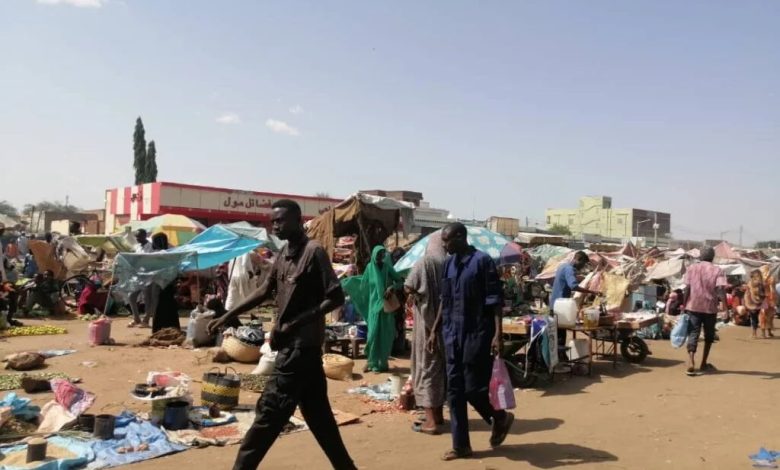On the Second Anniversary of the War… Will Sudan’s Economy Revive?

Sudan Events – Agencies
As of today, the war between the Sudanese army and the Rapid Support Forces (RSF) enters its third year amidst a deeply complex economic situation, with visible consequences reflected in the deteriorating living conditions across the country.
The 24-month-long war has led to severe devastation in Sudan’s productive sectors, with militia forces deliberately destroying key assets and infrastructure.
According to economic indicators, the country’s economic losses are estimated at around $200 billion since the outbreak of war. The conflict has also resulted in massive internal displacement and migration of Sudanese citizens to neighboring countries, with unofficial statistics reporting that 8.1 million people have been displaced from their homes.
Over the past two years, Sudan’s economic indicators have witnessed a catastrophic decline. Sudanese Finance Minister Dr. Gibril Ibrahim predicted that the economy would shrink by about 28% in 2024. Inflation surged from 83.6% in January 2023 to 146.6% in December 2023 and remained high at 142.34% in March 2025. Meanwhile, the exchange rate of the Sudanese pound plummeted to 2,500 pounds per US dollar, compared to about 560 pounds at the war’s onset.
Government institutions have lost many of their assets and resources, despite serious attempts to keep civil services running from the administrative capital, Port Sudan, in the east of the country.
Despite the severe losses, most institutions have started rearranging their priorities to rescue the economy from collapse.
Destruction of Institutional Assets
The Director-General of the Geological Research Authority, Consultant Ahmed Haroun, stated that RSF militias had destroyed the authority’s assets, including the seismic monitoring center and the authority’s specialized laboratories, vandalized its historic headquarters, and burned down its new tower.
In an interview with Al-Muhaqiq, Haroun confirmed the theft of ten drilling rigs—each worth about $1.5 million—from the central workshop in Khartoum North, in addition to the looting of heavy machinery the authority had received just two months before the war. He noted that the authority had begun purchasing replacement assets from its own resources and resumed exploration operations throughout Sudan.
Similar destruction also befell the Khartoum gold refinery, the national currency printing press, the National Museum, and numerous public and private institutions.
The Ministry of Industry acknowledged the war’s devastating impact on the industrial sector, which suffered severe structural damage. A study released by the ministry and reviewed by Al-Muhaqiq revealed significant industrial collapse in war-affected states, especially Gezira and Khartoum, where many industrial facilities were partially or completely destroyed.
The study also documented industrial activities in safer states, particularly in the food industry sector. There are currently 143 oil presses covering 69% of local consumption and 13 flour mills covering 77% of national demand.
Increased Gold Production
On the other hand, the Director-General of the Sudanese Mineral Resources Company, Mohamed Taher Omar, reported that operations had continued during the two years of war and efforts were made to boost gold production and revenues.
Speaking to Al-Muhaqiq, Omar said, “We managed to raise gold production in the second year of the war to 64 tons.”
He added, “We reduced the state’s share in violation-related mining companies from 28% to 20% to encourage production this year.”
Omar also revealed that 152 companies are currently operating in the mining sector, including four foreign producers. However, the company has lost much of its equipment and is functioning with only 30% of its workforce.
A Strangling Economic Crisis
Economic expert Dr. Waleed Daleel stressed that Sudan is experiencing a suffocating economic crisis driven by both regional and global dynamics, the ongoing war, and structural flaws in the domestic economy.
Daleel highlighted the severe deterioration, including the collapse of the local currency, soaring inflation, plunging living standards, and stalled economic activity.
Speaking to Al-Muhaqiq, Daleel emphasized the need for joint efforts at both governmental and societal levels, in addition to support from the international community.
He stressed the importance of adopting bold corrective economic policies aimed at restoring macroeconomic stability and internal and external balance through a comprehensive reform program in coordination with the International Monetary Fund and other financial institutions. He also called for effective social protection policies to mitigate the impact of reforms on the most vulnerable groups, ensuring they don’t bear the burden alone.
Eroded National Capacity
In turn, economic analyst Dr. Haitham Mohamed Fathi argued that the war has eroded Sudan’s economic capacity. Its impact extended beyond the destruction of economic sectors to include infrastructure, residential housing, and has severely affected development efforts, individual livelihoods, and social cohesion.
In an interview with Al-Muhaqiq, Fathi called for action on parallel fronts to promote economic recovery and reconstruction, restore essential services, and mobilize external financial resources to rebuild the destruction left by war—whether in housing or key sectors such as electricity, water, roads, bridges, education, health, and other damaged infrastructure and services.
Source: Al-Muhaqiq News Site



